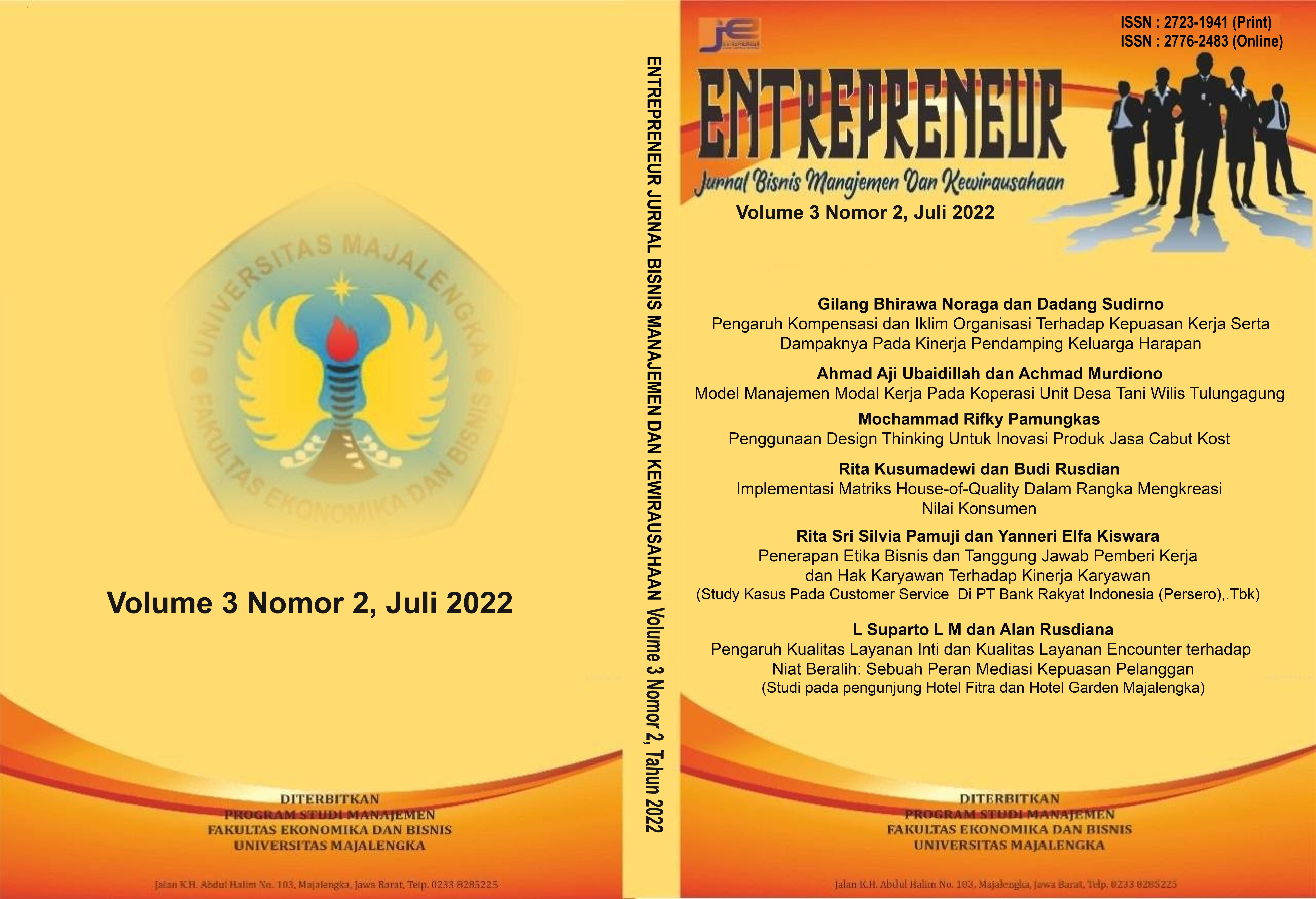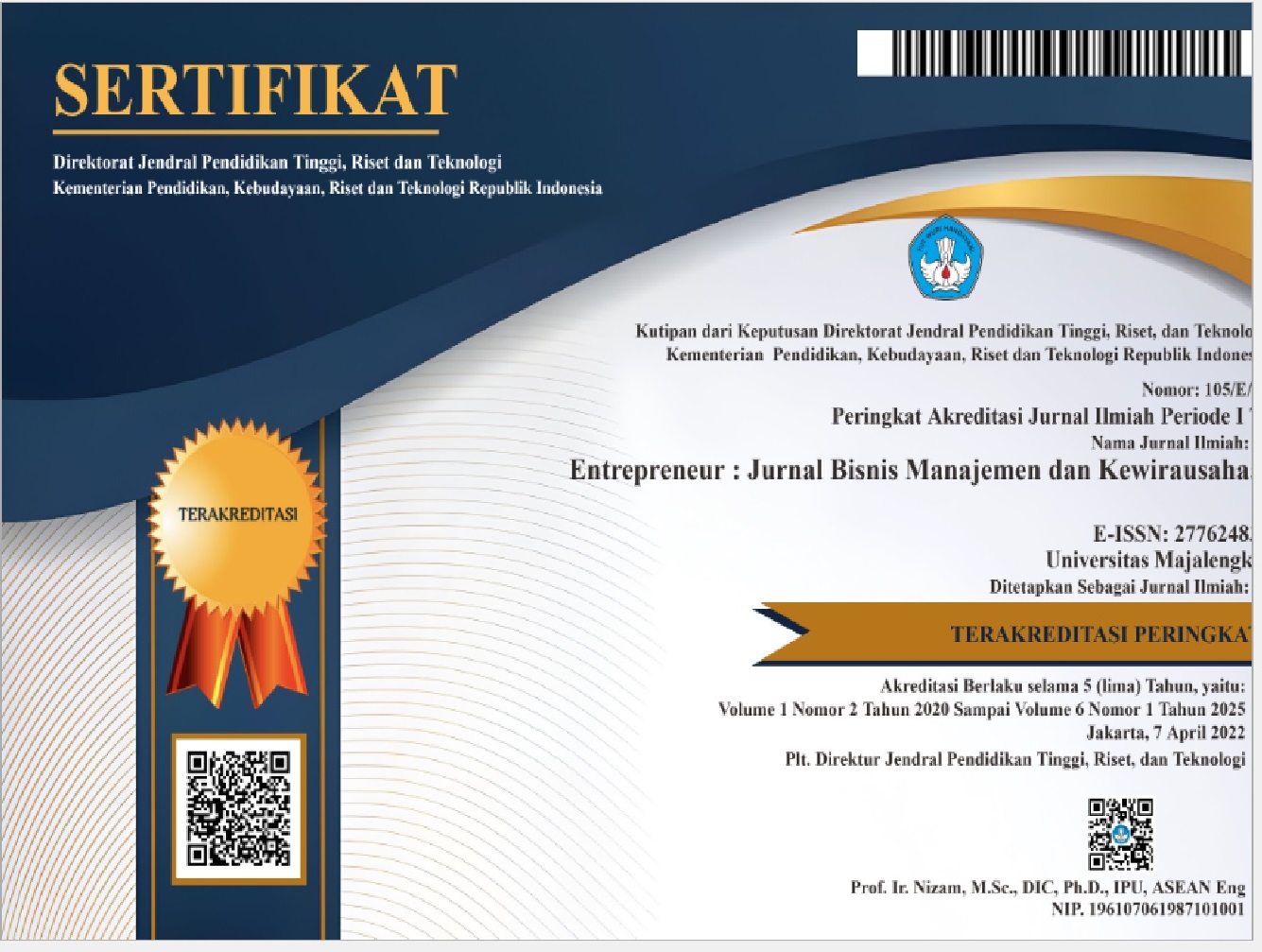PERAN PENDIDIKAN KEWIRAUSAHAAN DAN DUKUNGAN AKADEMIK DALAM MENINGKATKAN INTENSI BERWIRAUSAHA
DOI:
https://doi.org/10.31949/entrepreneur.v3i2.2738Abstract
Entrepreneurship has been considered to be one of the effective solutions according to the effort to reduce the high unemployment rate in Indonesia. This study aims to examine the effect of entrepreneurship education and academic support on the intensity of entrepreneurship. This research was conducted on students of the Maranatha Christian University Management Study Program. The type of research in this research is quantitative. Data in collecting questionnaire techniques and data processing using SmartPLS. The results showed that the variables of entrepreneurship education and academic support influenced the intensity of student entrepreneurship.
Keywords:
Pendidikan Kewirausahaan,, Dukungan Akademik, Intensi BerwirausahaDownloads
References
Adnyana, I., & Purnami, N. (2016). Pengaruh Pendidikan Kewirausahaan, Self Efficacy Dan Locus of Control Pada Niat Berwirausaha. E-Jurnal Manajemen Universitas Udayana, 5(2), 253915.
Alhaji, A. (2015). Entrepreneurship Education and Its Impact on Self-Employment Intention and Entrepreneurial Self-Efficacy. Humanities and Social Sciences, 3(1). https://doi.org/10.11648/j.hss.20150301.17
Aryaningtyas, A. T., & Palupiningtyas, D. (2017). PENGARUH PENDIDIKAN KEWIRAUSAHAAN DAN DUKUNGAN AKADEMIK TERHADAP NIAT KEWIRAUSAHAAN MAHASISWA (Studi Pada Mahasiswa STIEPARI Semarang). Jurnal Ilmiah Manajemen & Bisnis, 18(2), 140. https://doi.org/10.30596/jimb.v18i2.1398
Azwar, B. (2013). Analisis Faktor-faktor yang Mempengaruhi Niat Kewirausahaan (Entrepreneurial Intention) (Studi Terhadap Mahasiswa Riau). Menara; Jurnal Kewirausahaan, 12(1), 12–22. http://ejournal.uin-suska.ac.id/index.php/Menara/article/view/407
Badan Pusat Statistika. (2021). BPS: Sarjana yang Menganggur Hampir 1 Juta Orang pada Februari 2021. Databoks, 2021. https://databoks.katadata.co.id/datapublish/2021/05/31/bps-sarjana-yang-menganggur-hampir-1-juta-orang-pada-februari-2021
Bety, H. A. (2015). Pengaruh Pengetahuan Kewirausahaan Dan Lingkungan Keluarga Terhadap Minat Berwirausaha Siswa Kelas Xi Smk Islam Nusantara Comal Kabupaten Pemalang. X(1), 42–52.
Budi, R., Dan, L., Wijaya, T., & Mdp, S. (2012). Pengaruh Pendidikan Kewirausahaan Terhadap Minat Berwirausaha Mahasiswa di STIE MDP, STMIK MDP, dan STIE MUSI. Forum Bisnis Dan Kewirausahaan Jurnal Ilmiah STIE MDP Hal -112, 1(2), 112–119.
Bukirom, Indradi, H., Permana, A., & Martono. (2014). Pengaruh Pendidikan Berwirausaha Dan Motivasi Berwirausaha Terhadap Pembentukan Jiwa Berwirausaha Mahasiswa. Media Ekonomi Dan Manajemen, 29(2), 144–151.
Chun-mei, C., Chien-hua, S., & Hsi-chi, H. (2011). The influence of entrepreneurial self-efficacy on entrepreneurial learning behavior - using Entrepreneurial intention as the mediator variable. CSCanada International Business and Management, 3(2), 7–11. https://doi.org/10.3968/j.ibm.1923842820110302.4Z0145
Dabbous, A., & Aoun Barakat, K. (2020). Bridging the online offline gap: Assessing the impact of brands’ social network content quality on brand awareness and purchase intention. Journal of Retailing and Consumer Services, 53, 101966. https://doi.org/10.1016/j.jretconser.2019.101966
Draycott, M., & Rae, D. (2011). Enterprise education in schools and the role of competency frameworks. International Journal of Entrepreneurial Behavior & Research, 17(2), 127–145. https://doi.org/10.1108/13552551111114905
Fauziati, P., & Suryani, K. (2020). Pengaruh Pendidikan Kewirausahaan Dan Lingkungan Keluarga Terhadap Niat Mahasiswa Untuk Berwirausaha. Edukasi: Jurnal Pendidikan, 18(1), 76. https://doi.org/10.31571/edukasi.v18i1.1682
Ghozali, I. (2013). Aplikasi Analisis Statsitik Multivariate dengan Program IBM SPSS 21 Update PLS Regresi. Semarang: Badan Pnerbit Universitas Diponegoro.
Ghozali, I., & Latan, H. (2012). Partial least square: Konsep, teknik dan aplikasi SmartPLS 2.0 M3. Semarang: Badan Penerbit Universitas Diponegoro.
Ghozali, I., & Latan, H. (2014). Partial Least Squares konsep, metode dan Aplikasi menggunakan program WarpPLS 4.0. Semarang: Badan Penerbit Universitas Diponegoro.
Hair Jr., J. F., Matthews, L. M., Matthews, R. L., & Sarstedt, M. (2017). PLS-SEM or CB-SEM: updated guidelines on which method to use. International Journal of Multivariate Data Analysis, 1(2), 107. https://doi.org/10.1504/ijmda.2017.10008574
Harianti, A., Malinda, M., Nur, N., Suwarno, H. L., Margaretha, Y., & Kambuno, D. (2020). Peran Pendidikan Kewirausahaan Dalam Meningkatkan Motivasi, Kompetensi Dan Menumbuhkan Minat Mahasiswa. Jurnal Bisnis Dan Kewirausahaan, 16(3), 214–220.
Hejazinia, R. (2015). The Impact of IT-based Entrepreneurship Education on Entrepreneurial Intention. International Journal of Management, Accounting & Economics, 2(3), 243–253. http://search.ebscohost.com/login.aspx?direct=true&db=buh&AN=102557044&lang=de&site=ehost-live
Hermina, U. N., Novieyana, S., & Zain, D. (2011). Pengaruh Mata Kuliah Kewirausahaan Terhadap Minat Mahasiswa Menjadi Wirausaha Pada Program Studi Administrasi Bisnis Politeknik Negeri Pontianak. Jurnal Eksos, 7(2).
Indonesia, P. R., & Umum, K. (1999). Peraturan Pemerintah Republik Indonesia Nomor 60 tahun 1999 tentang Pendidikan Tinggi. Sekretariat Negara Republik Indonesia, 1, :pp. 36-54.
Karunia, H., & Hani. (2013). Pengaruh faktor Psikologis dan Kontekstual terhadap Intensi Berwirausaha Pada Mahasiswa. Proceeding Seminar Nasional Dan Call For Papers Sancall, 425–432.
Kothari, H. C. (2013). Impact of Contextual Factors on Entrepreneurial Intention. 6, 76–82.
Kurniawan, R. (2014). PENGARUH PENERAPAN MODEL PEMBELAJARAN TEACHING FACTORY 6 LANGKAH (TF-6M) DAN PRESTASI BELAJAR KEWIRAUSAHAAN TERHADAP MINAT WIRAUSAHA (Penelitian pada siswa kelas XII angkatan 2011/2012 Kompetensi Keahlian Patiseri SMK Negeri 9 Bandung). Universitas Pendidikan Indonesia.
Nguyen, C. (2018). Demographic factors, family background and prior self-employment on entrepreneurial intention - Vietnamese business students are different: why? Journal of Global Entrepreneurship Research, 8(1). https://doi.org/10.1186/s40497-018-0097-3
Rifqy, A. A. (2019). Universitas Bhayangkara Jakarta Raya Pengaruh Pendidikan Kewirausahaan dan Dukungan Akademik Terhadap Niat Kewirausahaan Mahasiswa. Jurnal Kajian Ilmiah, 19(2), 175–181.
Sahban, M. A., Ramalu, S. S., & Syahputra, R. (2016). The Influence of Social Support on Entrepreneurial Inclination among Business Students in Indonesia. Information Management and Business Review, 8(3), 32–46. https://doi.org/10.22610/imbr.v8i3.1330
Sarwoko, E., & Nurdiana, I. (2013). Gender differences in entrepreneurial intentions. International Conference on Entrepreneurship and Business Management, 2, 91–95.
Silvia, S. (2013). Pengaruh Entrepreneurial Traits dan Entrepreneurial Skills terhadap Intensi Kewirausahaan (Studi Empiris Dampak Pendidikan Kewirausahaan pada Mahasiswa Universitas Kristen Petra, Surabaya). Agora, 1(1).
Sugiyono, D. (2013). Metode penelitian pendidikan pendekatan kuantitatif, kualitatif dan R&D.
Suharti, L., & Sirine, H. (2012). Faktor-Faktor yang Berpengaruh Terhadap Niat Kewirausahaan (Entrepreneurial Intention). Jurnal Manajemen Dan Kewirausahaan, 13(2). https://doi.org/10.9744/jmk.13.2.124-134
Sujarweni, V. W. (2014). Metode Penelitian: Lengkap, praktis, dan mudah dipahami. Yogyakarta: Pustaka baru press.
Taneja, N., & Gandhi, P. A. (2015). An inquiry into entrepreneurial characteristics amongst students in Ahmedabad. Asian Journal of Management Research, 5(4), 487–496.
Tung, L. C. (2016). The Impact of Entrepreneurship Education on Entrepreneurial Intention: Engineering Students. Polish Journal of Management Studies, 14(1), 119–128.
Wardoyo. (2012). Pengaruh Pendidikan Dan Karakteristik Kewirausahaan Terhadap Intensi Berwirausaha Mahasiswa Pada Perguruan Tinggi Swasta Di Jakarta. Jurnal Bisnis, 2(1), 222–230.
Wibowo, A. (2011). Pendidikan Kewirausahaan.
Wiyanto, H. (2017). DUKUNGAN AKADEMIK DAN DUKUNGAN SOSIAL SEBAGAI PREDIKTOR NIAT BERWIRAUSAHA MAHASISWA (Studi Pada Mahasiswa Peminatan Kewirausahaan Program Studi S1 Manajemen Fakultas Ekonomi Universitas Tarumanagara). Jurnal Manajemen, 19(3), 374. https://doi.org/10.24912/jm.v19i3.35

Published
How to Cite
Issue
Section
License
Copyright (c) 2022 Alif Putra Suandi Alif, Henky Lisan Suwarno

This work is licensed under a Creative Commons Attribution-ShareAlike 4.0 International License.
COPYRIGHT NOTICE
An author who publishes in the Entrepreneur: Jurnal Bisnis Manajemen dan Kewirausahaan agrees to the following terms:
1. Author retains the copyright and grants the journal the right of first publication of the work simultaneously licensed under the Creative Commons Attribution-ShareAlike 4.0 License that allows others to share the work with an acknowledgment of the work's authorship and initial publication in this journal
2. The author is able to enter into separate, additional contractual arrangements for the non-exclusive distribution of the journal's published version of the work (e.g., post it to an institutional repository or publish it in a book) with the acknowledgment of its initial publication in this journal.
3. The author is permitted and encouraged to post his/her work online (e.g., in institutional repositories or on their website) prior to and during the submission process, as it can lead to productive exchanges, as well as earlier and greater citation of the published work







